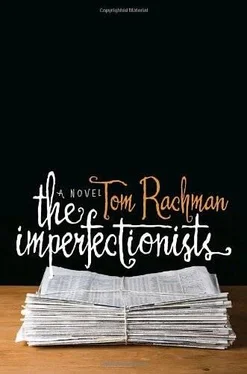He hits save. It is entry No. 18,238. "The Bible"-his name for the paper's style guide-was once printed and bound, with a copy planted on every desk across the newsroom. Now it exists solely within the paper's computer network, not least because the text has grown to approximately the size of metropolitan Liechtenstein. The purpose of his Bible is to set down laws: to impart whether a "ceasefire" is, properly speaking, a "cease-fire" or indeed a "cease fire;" to adjudge when editors must use "that" and when "which;" to resolve quarrels over prepositions, false possessives, dangling modifiers-on the copydesk, fisticuffs have broken out over less.
Kathleen raps on his door. "Such were the joys," she says wearily.
"Which joys are these?"
"The joys of trying to put out a non-embarrassing daily with roughly five percent of the resources I need."
"Ah, yes," he replies. "The joys of the paper."
"And you? Whose self-esteem are you dismantling today?"
He massages his fingers and dips them into his trouser pocket, which is swollen as if with pebbles. He retrieves a mound of sucking sweets that have melted together. "You'll be thrilled to hear," he informs her, popping the candies into his mouth, "that I have a new copy of Why? ready." By this, he means the monthly internal newsletter in which he decants his favorite blunders from the paper. It is fair to say the staffers do not greet each edition of Why? with elation.
Kathleen sighs.
"Duty does call, I'm afraid," he says. "Now, what can I do for you, my dear?"
She often stops by for advice. Her deputy may be Craig Menzies, but Herman is her true counselor. He has worked at the paper for more than thirty years, has held most editorial jobs here (though never reporter), and served as the acting editor-in-chief during interregnums in 1994, 2000, and 2004. Staffers still shiver to recall his stewardship. Yet for all his bluster Herman is not disliked. His news judgment is envied, his memory is an unfailing resource, and his kindness emerges for all those who hang around long enough.
"What are your thoughts about my culture shake-up?" she asks.
"You managed to dislodge Clint Oakley finally."
"Very proud of myself over that," she says. "And you were right: Arthur Gopal isn't a write-off. Things remain ugly on the stringer front, though. Still no one in Cairo. And Paris remains unmanned."
"How can Accounts Payable refuse to replace Lloyd?"
"It's insane."
"Outrageous."
"You here tomorrow?"
"Day off, my dear. Wait, wait-before you wander away, I wanted to warn you that I have a delightful new correction upcoming."
She groans; he grins.
Corrections have proliferated of late. A handful even earned a place on Herman's corkboard: Tony Blair included on a list of "recently deceased Japanese dignitaries;" Germany described as suffering from "a genital malaise in the economy;" and almost daily appearances from "the Untied States." He types out his latest publishable correction: "In an article by Hardy Benjamin in the Tuesday business section, the former dictator of Iraq was erroneously referred to as Sadism Hussein. The correct spelling is Saddam. We doubt that our typographical error impinged on the man's credibility, however, we regret-" He checks his watch. Miriam leaves tonight, and Jimmy arrives tomorrow. Herman still has much to do. He slips on his coat, jabs a finger in the air. "Credibility!" he says.
The front door to his apartment in Monteverde won't budge, so he shoulders it halfway open and, with a grunt, squeezes inside. His wife's luggage is blocking the passage. She is scheduled on an overnight flight from Rome back to Philadelphia to visit their daughter and grandchildren. The click-clack of her heels sounds down the hallway. "Sweetie pie," he calls, and edges past the luggage. "Sweetie pie, I'm afraid I banged one of your suitcases. The red one."
" Burgundy," she corrects him.
"That's not red?"
At work, Herman makes the corrections. Not here.
"I hope I didn't break anything. Were there presents in there? Should we open and check? What do you think?" Awaiting her judgment, he contorts as if before a teetering vase.
"It was packed perfectly," she says.
"I'm so sorry."
"I took ages doing that."
"I know. I'm terrible. Can I help?"
She kneels to unbuckle the luggage straps, and he raises a finger-not to prod the air this time but to beg permission. "Darling, might I possibly make you a drink? Might that be nice?"
"Can I check my bag first?"
"Yes, yes, of course."
He takes refuge in the kitchen, dicing carrots and celery. At the sound of her clicking heels, he swivels around. "A nice, hearty soup to fill you up for the long trip."
"You make me sound like a thermos."
He resumes chopping. "These vegetables are delicious-could I slice you a few?"
"Such a pity you can't come. But I guess you prefer Jimmy."
"Don't say that."
"Sorry," she says. "I'm being awful." She steals a carrot.
"Are you worried about the flight?"
She blinks in affirmation, then studies his soup mix. "Needs salt."
"How can you say?" he protests, then tastes it. She is right. He salts the soup, stirs it, kisses her cheek.
After dinner, he sees Miriam off at the airport and speeds home in their dented blue Mazda, a tiny model that, with him inside, looks like a bumper car. He tucks fresh sheets on the spare bed for Jimmy and tidies up. But there is not as much preparation as he'd expected. He runs a finger around the pot of cold soup (acquacotta di Talamone: chopped carrots and celery, chopped pancetta, pumpkin, zucchini, kidney beans, lima beans, artichoke hearts, grated pecorino, ground pepper, eight boiled eggs, fourteen pieces of toast). He and Jimmy met in Baltimore in the late 1950s, the only Jewish kids at a Presbyterian private school. Herman had been sent there by his father, a foul-tempered Zionist and a dead ringer for Karl Marx who believed the best school in the district should be forced to swallow a fat little Jew, namely, his son. The fat little Jew himself saw few benefits in being someone else's battering ram. But, thankfully, he had been preceded at the school by another Jewish kid, Jimmy Pepp, who enjoyed legendary status there for having climbed atop the church library and smoked a pipe on the roof. They said he had descended via the drainpipes and kept the tobacco smoldering all the way down. And it had been windy. The tale was dubious, but there was no denying that as a youth Jimmy had kept a pipe, a curved marvel with a meerschaum bowl and mahogany body that he puffed on the hill behind school, often leaning over a book of poetry-E. E. Cummings, say, or Baudelaire. He was also notable as the only pupil not to wear the school blazer, which he evaded with a falsified doctor's note claiming "seborrhoeic dermatitis." None of the teachers dared ask what this affliction consisted of-a fortunate turn, since Jimmy himself could only have guessed. The reason for his subterfuge was simply that he preferred to wear a donnish tweed jacket with elbow patches, in whose left pocket he kept a copy of Ulysses-the Modern Library edition, missing the dust jacket-and in whose right pocket he stored his calabash pipe and a tin of Mac Baren Club Blend tobacco. The balance between left and right pockets was grossly uneven, Ulysses being a notably heavy volume, so he evened it out with fountain pens, which often exploded, bleeding a constellation of indigo blotches into his right pocket. For a reason Herman never understood, Jimmy protected him at school from the day they met.
He is among the last to emerge off the afternoon flight from Frankfurt.
"Welcome," Herman says, beaming and reaching for Jimmy's bag, then changing his mind and throwing a thick arm around his narrow friend. "You got here."
Читать дальше












